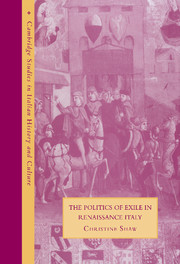Introduction: The wheel of fortune
Published online by Cambridge University Press: 31 July 2009
Summary
Every day these exiles seem to me to be in worse condition – they flock together like starlings, and they are discontented, and they have spread many rumours, as those who have been turned out do, which are not very pleasing to your friends.
Much of the experience of political exiles in Renaissance Italy is encapsulated in this quotation from a report by a Sienese ambassador in Rome in March 1485 – their clustering together with other exiles from their home to seek support, and comfort; their financial difficulties and their periods of discouragement; their efforts to undermine the regime back home that had driven them away; the close surveillance by the agents and friends of their political enemies, a token of the threat they were considered to be; and the hostility and disparagement with which those enemies spoke of them and treated them. Another common aspect of the experience of exiles is also exemplified by this report of the ambassador, Guidantonio Buoninsegni. Only a few years before he had himself been in exile in Rome, and the year after he spoke so scornfully of the opponents of the regime in Siena he fell foul of it himself, and was once again in Rome as an exile. Many an exile did return, sometimes to be reconciled to his opponents, sometimes to take his revenge on them. Many a member of the political elites of Italy knew what it was like to be bound to fortune's wheel.
- Type
- Chapter
- Information
- The Politics of Exile in Renaissance Italy , pp. 1 - 4Publisher: Cambridge University PressPrint publication year: 2000

